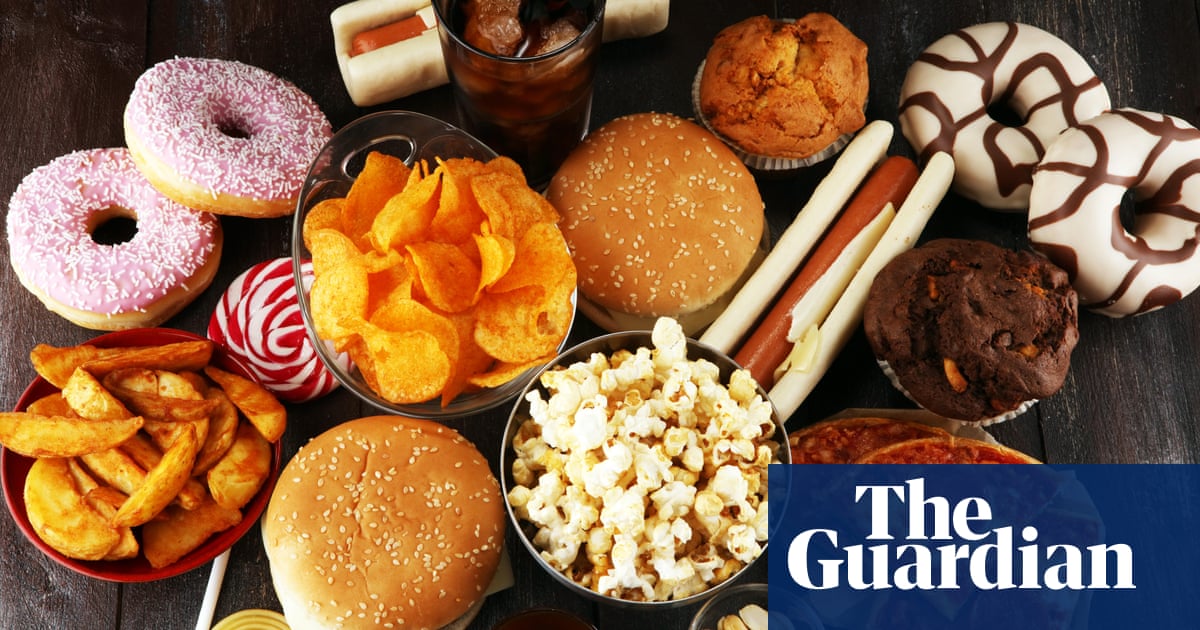Consuming large amounts of ultra-processed food (UPF) increases the risk of an early death, according to a international study that has reignited calls for a crackdown on UPF.
Each 10% extra intake of UPF, such as bread, cakes and ready meals, increases someone’s risk of dying before they reach 75 by 3%, according to research in countries including the US and England.
UPF is so damaging to health that it is implicated in as many as one in seven of all premature deaths that occur in some countries, according to a paper in the American Journal of Preventive Medicine.
They are associated with 124,107 early deaths in the US a year and 17,781 deaths every year in England, the review of dietary and mortality data from eight countries found.
Each 10% extra intake of UPF, such as bread, cakes and ready meals, increases someone’s risk of dying before they reach 75 by 3%, according to research in countries including the US and England.
Was a bit surprised to see bread there, as it’s been a staple of many cultures’ cuisines for millennia. Did a quick search, and got some clarity in this list - “mass-produced packaged bread” is UPF, not the stuff you make from scratch or perhaps pick up from the local bakery.
A relief, actually, as I just took a loaf of sourdough out of the oven and was waiting for it to be cool enough to slice into. This article took the shine off the experience for a moment there 😅
Yeah the typical American stuff is like 10% sugar, packed with additives like emulsifiers and preservatives, and anything that makes the production processes cheaper and faster, made from bleached flour and has most of the fibre stripped out.
If your bread is made from flour, water, salt and yeast its processed food not UPF.
The supermarket bread that looks and feels like a squeaky toy. Best to avoid that one.
But I like the sound it makes when I eat it :(
I remember the first time I visited the States, and bought a loaf of bread and a jar of peanut butter from the grocery store on my first night to make toast the following morning. Boy, did the unexpected sugar hit at breakfast time wake me up! HFCS really is in everything over there. Not at all surprised that packaged bread is classed as UPF.
I’m sure the actual paper defines this better, but without a definition of what puts something in this category, it’s not useful.
Even for bread, is it all bread? Is it added gluten? Is it a specific preservative? Is it only bread with bleached flour?
Even so, mass produced and packaged is not the actual contributor…
Same with prepared food… Costco makes prepared food that is equivalent to what you’d make at home. It’s that still bad? If not, what other prepared food is fine?
Even for bread, is it all bread?
It’s most bread. There will always be a few outliers, but they’re a tiny minority.
Is it added gluten?
Gluten isn’t ‘added’ to bread, it’s a naturally occurring component of grains like wheat, rye and barley. Gluten free bread is made from alternative grains that naturally do not contain gluten (sorghum, rice, buckwheat, etc.). Gluten isn’t unhealthy unless you have Coeliac disease or a gluten sensitivity/intolerance. It won’t factor into UPF status.
Is it a specific preservative?
The ideal bread is preservative free. Mass-produced bread is almost never preservative free, because the time it takes for the bread to be baked, shipped, put on the shelf in a shop, picked up by you and taken home to eat is longer than it takes to go mouldy (particularly if it’s in a plastic bag). Hence, they add a preservative to extend the shelf life.
A bakery is less likely to use preservatives, because they bake fresh daily, based on customer demand. Homemade bread also doesn’t need preservatives for pretty much the same reason.
No need to demonise preservatives, or split hairs over “better” or “worse” ones, but worth being mindful of the amount you consume.
Is it only bread with bleached flour?
Bleached flour improves performance for baking (making lighter, fluffier loaves with more ‘bounce’ and chewiness from the gluten), but also strips out a lot of the minerals that are beneficial for your health. Mass-produced bread tends to use bleached flour, because a white and fluffy loaf is more appealling to consumers than a denser and darker one, and the lighter consistency makes it less filling, leading you to consume more of it, which means more money for them. Given the choice between bleached and unbleached flour, choose the latter if you can.
So, yes, ‘mass-produced and packaged’ does tend to correlate directly with the overall nutritional content.
Costco makes prepared food that is equivalent to what you’d make at home.
I can only speak for myself on this one, but I’ve never seen a pre-prepared meal at Costco that is the equivalent of what I’d make at home. It tends to be carb, fat and animal protein heavy, and very light on veg. My cooking is the opposite (lots of veg, some complex carbs, not too much fat or animal protein).
Just like the preservatives and bleached flour in bread, companies who mass-produce food are looking to use the cheapest ingredients with the longest shelf life to maximise their profits. Makes good business sense for them, but not good health/nutritional sense for consumers.
Enjoy that sourdough!! I have always wanted to get into baking bread. I will eventually get there someday. The semolina my local bakery makes is 😗🤌 i love bread
Ooh, semolina, nice! Love me some Pane Siciliano… Think you just inspired my next loaf 🤭
(Highly recommend breadmaking as a hobby, if the spirit moves you. Very meditative - particularly the kneading - with bonus baked goods when you’re done!)
The NOVA classifications are difficult to work with, and I think the trend of certain nutrition scientists (and the media that reports on those scientists’ work) have completely over-weighted the value of the “ultra processed” category.
The typical whole grain, multigrain bread sold at the store qualifies as ultra-processed, in large part because whole grain flour is harder to shape into loaves than white flour, and manufacturers add things like gluten to the dough. Gluten, of course, already “naturally” exists in any wheat bread, so it’s not exactly a harmful ingredient. But that additive tips the loaf of bread into ultra processed (or UPF or NOVA category 4), same as Doritos.
But whole grain bread isn’t as bad for you as Doritos or Coca Cola. So why do these studies treat them as the same? And whole grain factory bread is almost certainly better for you than the local bakery’s white bread (merely processed food or NOVA category 3), made from industrially produced white flour, with the germ and bran removed during milling. Or industrially produced potato chips, which are usually considered simply processed foods in category 3 when not flavored with anything other than salt, which certainly aren’t more nutritious or healthier than that whole wheat bread or pasta.
If specific ingredients are a problem, we should study those ingredients. If specific combinations or characteristics are a problem, we should study those combinations. Don’t throw out the baby (healthy ultra processed foods) with the bathwater (unhealthy ultra processed foods).
And I’m not even going to get into how the system is fundamentally unsuited for evaluating fermented, aged, or pickled foods, especially dairy.
I feel like this is an area of “science” that’s just a mish mash of various corporate lobbying.
Absolutely correct. This classification system points the finger at things that everyone (read: everyone who had a semblance of nutritional education) knows are bad for you, but then lumps in things like bread and cheese with them! So of course people who don’t know much better hear this, they’ll think “well if bread and cheese are just as bad for you as Cheetos, of course I’m getting the Cheetos, they’re delicious”.
If specific ingredients are a problem, we should study those ingredients. If specific combinations or characteristics are a problem, we should study those combinations. Don’t throw out the baby (healthy ultra processed foods) with the bathwater (unhealthy ultra processed foods).
We’ve been doing that for years, and the result on public health has been fad diets and “superfoods”. Focusing on ultra processed foods specifically calls out the obvious problem - we were significantly healthier before these foods were invented, and are less healthy after. The categories for processed-ness are necessarily arbitrary, since we have to decide what constitutes “processed”, and so sometimes relatively healthier food ends up appearing “worse” than less healthy food. But the end result is the headline above, which can be pointed to the hundred billion times it must be pointed to, in order to convince people that they should not eat a diet consisting of Doritos, mountain dew, slim jims, and ice cream.
Focusing on ultra processed foods specifically calls out the obvious problem - we were significantly healthier before these foods were invented, and are less healthy after.
But what confounding variables have also increased during this time? Do we have endocrine disruptors in our drinking water or food packaging or in the foods themselves, from microplastics or whatever? Have we been fertilizing our fields with industrial waste containing toxic “forever chemicals”? Have we become more sedentary at home and at work? I mean, probably yes to all of these.
I do believe that nutrition is more than simple linear addition of the components in a food. But insights can still be derived from analyzing non-linear combinations (like studying the role of fiber or water or even air in foods for the perception of satiety or the speed that subject ingest food), or looking towards specific interactions between certain subsets of the population with specific nutrients. We can still derive information from the ingredients, even if we move past the idea that each ingredient acts on the body completely independently from the other ingredients in that food.
And look, I’m a skeptic of the NOVA system, but actually do appreciate its contribution in increasing awareness of those non-linear combinations. But I see it as, at most, a bridge to better science, not good science in itself.
I believe nutrition is quite simple: Eat real food. That will get you 90% of the way there, if you are an average person who just wants to be healthy.
deleted by creator
Some bread is treated with stuff one would ordinarily not want to eat.
So why not focus on the foods containing that stuff, rather than the superficial resemblance of all foods that kinda look like the foods that contain that stuff?
Let’s say you have a problem with potassium bromate, a dough additive linked to cancer that remains legal in U.S. bread but is banned in places like Canada, the UK, the EU.
So let’s have that conversation about bromate! Let’s not lump all industrially produced breads into that category, even in countries where bromate has been banned.
Another cancerous item is sodium benzoate. I use it to make photos. It reacts with UV light in gelatin to cause the gelatin to harden up. That same effect is what give you cancer. Its the free radicals generated during UV exposure.
Yeah, but it’s delicious and makes me feel good and I don’t want to be 90 anyway. Wait, smokers say that. Shit.
Is there a link to the actual study? The American Journal link seems to be a different one, and that one has a massive list of types of items classified as UPF (check Appendix A, Table 1), so it’s hard to identify what the causal factor(s) are.
Here’s a link to the journal website with a search for ultra-processed food.
https://www.sciencedirect.com/search?qs=ultra-processed+food
this feels like common sense
Just when I discovered frozen meals… 😟
There are different levels of processed food. A meal cooked, frozen, and shipped can have less risk than a sausage with a stick in it wrapped with a blueberry pancake infused with syrup.
Use your best judgement.
Why is your font size smaller than everyone else’s? Very odd.
I have no clue. It looks the same to me.
“Use your best judgement” to read ingredient lables and spend a few hours looking up what you don’t recognize.
You’ll quickly get a grip on what is processed and what is ultra-processed, and why the later is not so great.
I guess I’ll just photosynthesise 🌻
A certain leader eats a shitload of them each week, so we can only hope xD
It’s a shame that bread and donuts are de facto considered ultra processed foods now. Done right, they totally aren’t.
Even done fast they could be better.
The Aerated Baking Company had bread close to as fast and cheap as the modern Chorleywood process, but it isn’t ultra-glutenous. They were also an early feminist icon.
The pictures also shows french fries and popcorn. In my house those are literally just potatoes and olive oil and popcorn and olive oil respectively, maybe some salt. Bad for me? Maybe, but ultra processed?
Slicing them to vastly multiply their surface area so that more Maillard reaction can occur, and it’s that Maillard reaction that causes the yummy browning, and causes the proteins and starches to change and become potentially harmful/carcinogenic, plus yes the addition of fatty oil that wasn’t present at all.
A lot of us think of “processing” as like, something a food processor does - reducing and changing the form. But it’s also the chemical changes that occur during cooking as a result of the physical processes. When you look at the before/after of a potato and an equal volume of fries, it’s apparent you’ve drastically changed the base food.
I see. Well…
Fuck!
Yeah, cutting, cooking, chemically altering, and dehydrating foods are all forms of processing them. There are very few foods people can actually eat without any form of processing, and the ones that we can offer basically no protein, fat, or complex carbohydrates, mostly just sugar, fiber and vitamins (not necessarily bad, but you need more)
I think they might be referencing the pre-packaged-already-popped popcorn or the microwavable version.
I hope so. I admit, I didn’t read the article.
I’m rather surprised you are able to pop corn with olive oil. Temp-wise you would hit the smoke point well before the oil was hot enough to pop the kernals, which would be smoky misery in the kitchen.
Nope works fine. But you can’t use extra virgin olive oil. It has a lower smoke point. Also I’ve found you can do a small bowl or a regular bowl but a large one is best done in two shots.
I used to just use a brown paper bag. Put about a teaspoon of olive oil in the bottom and a little less than a 1/4 cup of popcorn in the bottom (it will start to bleed through, so I put it on a paper towel), put a couple staples in the top (no they won’t spark) and nuke for maybe a couple of minutes.
This did not produce enough popcorn for my addiction, so I started using as plastic microwave popcorn bowl someone gave me. It was more or less the same recipe but I was able to up the quantity a little bit. I didn’t like cooking in plastic though, so now I use a Pyrex bowl with a square plate over the top. The square plate is too keep the popcorn in but still have a little space for the steam to escape. I like not having plastic in the equation anymore but there are some drawbacks.
-
It takes about 5.5 minutes now(1st world problem).
-
The bowl gets really hot so you MUST use oven mitts to handle it.
-
The salt, which I put in before popping, seems to stay more in the bowl than on the popcorn.
-
I’m constantly worried that at some point the bowl is just going to explode.
YOU’RE USING A MICROWAVE?!?!?!

-
Not true, I use EVOO and it doesnt smoke. Oil goes in with a couple of kernels on the heat, when they pop remove and add the rest of the kernels. Remove when popping stops.
Maybe its a case of lower heat, more time?
I use grapeseed oil in my dutch oven to make popcorn. I assumed olive oil wouldn’t work, maybe I’ll try a batch with olive oil. I’ll let y’all know later if I smoke my kitchen out or not lol
Isn’t the reason it pops because of steam building up pressure inside the kernel? Then you would only need to heat them somewhere above 100C, and evoo doesnt smoke until 200C+
Oh you can also use coconut oil. I guess some people say it has a good flavor but I have to say I don’t notice any real olive oil flavor in my popcorn but I really use very little. My popcorn is pretty dry, which is how I like it.
I feel like we’ve known this for a very long time
We’ve known about climate change for a long time too. “We” not all of us.
True
surprised Pikachu face
You say that like its a bad thing.
What is considered an ultra-processed food? Like… Cheese is processed (all cheese; it isn’t just found, it’s made by processing milk). Is it ultra processed? What about a hot dog?
It seems cheese just missed the mark for ultra status according to this specification I found on webMD.
a quick summarisation is that there are 4 groups:
- Unprocessed or minimally processed foods (berries, nuts etc).
- Processed culinary ingredients (oils, butter, sugars etc).
- Processed foods (cheese, bread. Stuff with 2+ ingredients).
- Ultra-processed food and drink products (preservatives, additives, all the bad -ives).
So I’m guessing a hot dog would be ultra processed due to preservatives and additives often found in the ‘meat’.
That was an interesting rabbit hole to go down. Feels as though what is considered ultra-processed by the experts, is what us laymen tend to refer to as processed foods. I suppose technically their terminology is correct (the best kind of correct ofc), but it just feels like an exaggeration due to everyday usage of the term being what it is.
Edit: formatting.
Thank you. 🐇
How is milk processed? It’s pasteurized, which means it’s heated to kill bacteria. Nothing is added to the milk … so no, it is NOT considered a ‘pprocessed’ food.
Firstly, pasteurisation is most definitely a process.
Secondly, it’s very unlikely you are buying milk which has only been pasteurised, it has very likely at least also been homogenised, after being mixed from various different sources in order to produce a mill standardised fat & milk solids. The vast majority of the time rather than just being blended, it has been centrifugally separated into fractions that are then recombined in order to create a standard product.
None of this is really bad, btw, but it is 100% processing.
Don’t forget to add in the vitamin D. Otherwise I won’t absorb enough calcium.
Unfortunately I don’t actually drink milk anymore. Maybe I get a gallon every few months.
Look up how to make cheese.
It is highly processed.
It is grass that has gone through a cow.
Grass is highly processed.
It’s carbon dioxide, dihydrogen monoxide and photons that have gone through photosynthesis.
I’m just going to eat hydrogen from now on
Trophicmaxxing
I’m not sure about milk, but high temp heating is not something that occurs naturally. I am pretty sure heating kills both good and bad stuff so it chemically alters milks, even if minimally. If it is altered chemically or it’s nutrient profile changes or it goes through a process that doesn’t occur regularly, naturally in nature, I consider it processed.
Some form of processing is necessary to prevent disease, i am not against processed stuff to prevent disease.
Eating raw wheat seed, our body can’t absorb anything, eating powered wheat we still can’t absorb much nutrient. The moment we add water and heat and make bread, we break the cell walls, and now we can absorb most of the nutrients. It also raising the glycemic index of wheat.
I don’t consider fermented (decomposition) stuff like yogurt as processed since it can occur naturally, I just see it as a different food, like a seed is a food that can naturally become a plant that is also a food.
Gotta up my junk food consumption then
It is my life’s dream to die clutching my heart as I’m giving a presentation in front of hundreds of people.
The food industry is going to go through the same rebuke that the tobacco industry went through only bigger.
Should go through, but it won’t.
Tobacco? Should have gone through, but it didn’t.
What’s going to be the upf equivalent of vapes?
Wraps.
I switched from white bread to 100% whole grain about a decade ago after learning just how much better it was supposed to be. I wonder if it’s actually still pretty awful after reading this
No, it’s not. This refers to pre-packaged bread, e. g. white bread, toast etc. - the stuff you find in a supermarket shelf, full of preservatives and other additives.
Sigh… I get my wholegrain pre-packaged. I guess I’ll die.
If your bread goes moldy in a week, you might be good! (Am not an expert)
Often in less than a week, especially in a warm humid climate (or days of that type weather).
So… leading German “Toastbrot” brand, Goldentoast, their “American Sandwich”:
Wheat flour, water, wheat sourdough (wheat flour, water), canola oil, sugar, yeast, salt, acidity regular sodium acetates, fava bean flour. May contain traces of soy, milk, mustard and lupins.
I do wonder why they feel the need to have an acidity regulator, the sourdough those industrial outfits are using is made using pure-bred strains, highly replicable and generally flexible enough to get the exact amount and type of acidity (lactic vs. acetic acid) that you want. Fava bean flour last definitely looks like they did quite some engineering, those are minuscule adjustments to the overall flour mix. Used as a characteristic ingredient you’d use 20% of flourweight of the stuff, thereabouts, and about 5% if you want it for dough properties.
Is it good bread, no, but nutritionally it doesn’t really look worse than any other white bread. Actually American bread would be highly illegal over here.
For comparison, an American store brand toast:

That’s what happens if you’re a) allowed to do it and b) want to erase “time” from the ingredient list. All those dough conditioners are unnecessary even if you don’t use sourdough if you only give the dough enough time to autolyse: Actually have the water seep in, not just wet the particles, where enzymes then change the chemical structure, e.g. turning starch into maltose. Those enzymes come with the flour, they’re how the seeds themselves turn storage into ready energy.
German industrial bakeries have long lines of essentially bioreactors taking the dough through various processes over a day or so, which is the same pace that traditional bakeries use, just scaled up and highly controlled. Also for pre sliced bread they’re baking like 2m long loaves, in a conveyor oven. That American label is the bread equivalent of a beer brewed in a day, which is about at least four weeks too fast.











